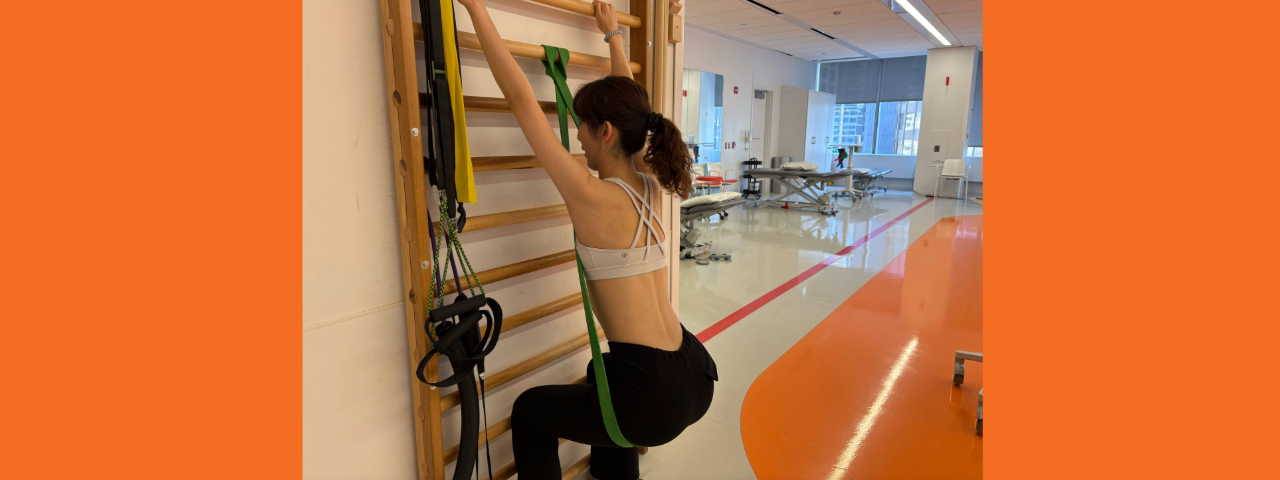Body
In August 2009, when she was a 16-year-old high school student, Lauren was diagnosed with Guillain-Barre syndrome — an autoimmune disorder in which the immune system attacks the nerves. Paralyzed from the neck down and unable to breathe on her own, Lauren was admitted as an inpatient at Shirley Ryan AbilityLab (then, the Rehabilitation Institute of Chicago), later transferring to DayRehab and Outpatient therapy at suburban locations.
Two months after being diagnosed, she was healthy enough to leave the hospital to distribute medals at the organization’s annual SkyRise stair climb and fundraiser. One year later, she was able to participate in SkyRise 2010 — climbing 103 flights of stairs on her own. In 2019, Lauren reflected on the 10-year anniversary of that full-circle moment.
Today, she harnesses the emotions — from fear to hope — she felt while a patient into her role as a Shirley Ryan AbilityLab occupational therapist, treating patients who have experienced spinal cord injuries (SCI).
Read Lauren’s “My Why” story:
How did your experience as a patient influence your decision to become an OT?
Body
Until I was 16, I didn’t have the faintest idea about what career path I wanted to pursue in life. After my experience with Guillain-Barre syndrome, I knew I wanted to work in the healthcare field. I truly felt like I had received exceptional care, and I genuinely wanted to pass along that care to others.
I considered many different healthcare professions, but decided on occupational therapy. What set OT apart for me was the blend of science, mental health and the emphasis on working on a variety of activities that are meaningful to the patient. I think all therapy disciplines at Shirley Ryan AbilityLab do a great job of targeting individualized goals, but when I was a patient, my OTs worked with me to return to the high school classroom, play sports and spend time with my friends.
Since I had been a pediatric patient, I first thought I’d work with the pediatric population. But, after working on the inpatient float team for more than two years, I discovered my true passion resides with working with adults after spinal cord injuries.
After your experience as a patient, what was it like to return on your first day as an employee?
Body
I’ve had a few different roles on a few different teams, so I’ve had multiple “first days.” On each of them, I felt excitement about growing my skillset, expanding my knowledge in different research or clinical areas, and collaborating with amazing teams of people. My first “first day,” was in October 2016: I was a part-time research aide in the Pain Management Center, working during OT school. I worked there for two years until I transitioned to a full-time OT role on the Inpatient Float Team. About two years later, I moved to the 21st Floor of the flagship hospital. On my first days — and, really, every day — I think about how I am grateful to have the opportunity to help others in whatever capacity I can, and I aim to provide the level of care that helped me return to my daily life and doing all the things I love.

What is a typical day like for you?
Body
It can include anything from teaching patients how to use the bathroom on their own and working on wheelchair skills to allow for independent mobility to getting on the ground to play with dogs or kids, aquatic therapy in our pool, or community outings to Chicago's museums, restaurants, airports and more! I am motivated to work hard by seeing the hard work and positive changes every single day in those I work with. When people with spinal cord injuries first get to our unit, they often haven't been introduced yet to wheelchairs or adaptive techniques that will better allow them to do all of the things they want to do in their daily lives. Seeing their daily progress encourages me to work hard and push them to achieve the high goals they set for themselves. Also, each person I work with is so incredibly unique in their physical presentation, background and interests, and I enjoy the challenge of working alongside each of these people to assist them in achieving their unique goals.
What was your proudest day at Shirley Ryan AbilityLab?
Body
Any time a patient accomplishes something for the first time since their injury. It is extremely rewarding to see my patients be proud of achieving something — such as getting themselves dressed or transferring into their wheelchairs — that will ultimately allow them to be more independent and participate as fully as possible in their daily lives again.
If you had to describe Shirley Ryan AbilityLab using one word, what would that be?
Body
Hopeful. I remember feeling extreme uncertainty when I was a patient, but the Shirley Ryan AbilityLab staff never wavered in encouraging hope. Even though no one could tell me for sure what I would look like six months, or a year, or five years out, I always felt reassured that everything would be OK even if it looked different in the moment. And, it did look different at first: I needed special accommodations in school and took time off from a lot of the activities I loved doing. Now, I try to instill the same hope in my peers and patients.
Join the Shirley Ryan AbilityLab Team
Body
Learn more about Shirley Ryan AbilityLab Careers.

